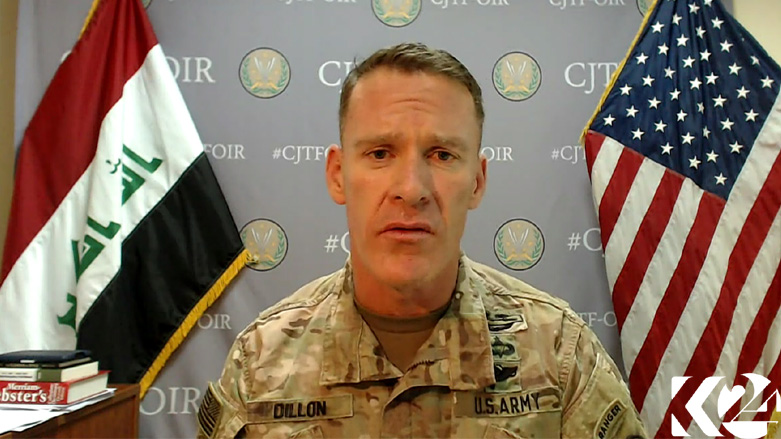Coalition concerned by some Shia militia groups’ priorities: Spokesperson

ERBIL, Kurdistan Region (Kurdistan 24) – The anti-Islamic State (IS) coalition is concerned with some militia groups whose priorities might be at odds with the Iraqi Federal Government, the spokesperson said on Tuesday.
In a video conference from Baghdad, the Spokesman for Operation Inherent Resolve (OIR), Army Colonel Ryan Dillon said that while the US-led coalition was working with Peshmerga and Iraqi Forces, some elements within the wider Iraqi security forces’ umbrella were cause for concern.
“We are concerned with some militia groups that don’t have Iraq’s priorities as their first priority.”
Dillon reminded that the Popular Mobilization Forces (PMF), also known as the Shia Hashd al-Shaabi militia, fall under the umbrella of the Iraqi Army and should “follow the orders of the Commander in Chief,” Prime Minister Haider al-Abadi.
“The coalition cannot train or support certain elements of the PMF, because of certain laws and restrictions,” Dillon continued without going into detail. He confirmed that “certain groups within the Iraqi security forces” do not receive “equipment or support from the US.”
Members of the US-led coalition have been participating in talks and negotiations being held between the Kurdish Forces and the Iraqi forces in Mosul. The meetings are a culmination of a series of assaults launched by Iranian-backed Shia militias and Iraqi troops on disputed areas and attempts to take control of border crossings in the Kurdistan Region.
The Kurdish leadership and community have criticized Washington’s silence regarding Baghdad’s use of military force against Kurdistan, and most notably the use of US-supplied weapons by the Iranian-backed Hashd al-Shaabi in Kirkuk and on the outskirts of Erbil.
“The coalition is here to help find a solution, but it’s a discussion that must happen between the Iraqi forces and the Peshmerga,” affirmed the spokesman.
“We are present in the discussions but not active members,” said Dillon. “We will remain until a final decision is made.” No agreement completed yet, but senior members of the clashing parties continue to meet this week.
Dillon also reiterated that the coalition was encouraging dialogue as opposed to fighting.
“No more fighting needs to happen. We’ve fought shoulder to shoulder with both Peshmerga and Iraqi forces. This was an unprecedented cooperation between the two, and we would like to see that continue.”
The coalition remains focused on fighting IS and “keep them gone,” as Dillon warned the jihadist group still poses a threat. “Even after its physical defeat, the threat will remain.”
He pointed out that in the last ten days, 20 militants were arrested in areas near Hawija, stressing that the operations were ongoing, but did not address how the incursions in northern Iraq were affecting the fight against IS.
“We are hoping for regional stability,” he concluded, adding that a post-IS coalition strategy would extend its presence in Iraq and the Kurdistan Region.
